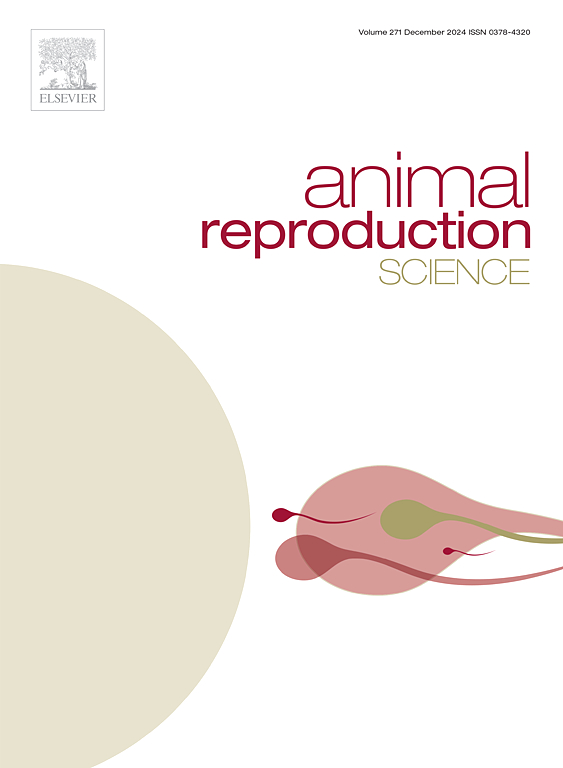母体饲粮蛋白质对牲畜发育、生产和健康的作用
IF 2.2
2区 农林科学
Q1 AGRICULTURE, DAIRY & ANIMAL SCIENCE
引用次数: 0
摘要
在猪、牛和羊等经济上重要的家畜物种中,母体膳食蛋白质在塑造后代发育、健康和生产力方面发挥着关键作用。妊娠期蛋白质摄入影响后代的多种生理过程,如胎儿生长、代谢程序、肌肉发育、免疫功能、生殖和肠道健康。母亲蛋白质摄入的具体影响因物种和妊娠期而异,因为在整个怀孕期间对蛋白质的需求波动,以支持胎儿发育和产后适应。本文系统地探讨了母体蛋白质营养对不同物种后代的影响,并确定了研究中观察到的共性和差异。研究表明,母体蛋白质限制可导致后代出生体重降低、肌肉生长受损、代谢程序改变和免疫功能受损,潜在地影响其长期生产力。相反,过量的蛋白质摄入也可能产生不良影响,如免疫失调和代谢失衡。母体蛋白水平的影响超出了出生,影响出生后的生长轨迹、繁殖性能和肠道微生物群组成。虽然在理解这些关系方面取得了相当大的进展,但在确定这些影响的精确分子机制方面仍然存在差距。未来的研究应侧重于改进针对不同牲畜品种的饮食建议,调查妊娠期特异性蛋白质需求的作用,并整合多组学方法来阐明母体蛋白质摄入的长期后果。对这些机制的深入了解将有助于优化饲养策略,提高动物福利,提高牲畜生产系统的可持续性。本文章由计算机程序翻译,如有差异,请以英文原文为准。
The role of maternal dietary protein on livestock development, production and health
Maternal dietary protein plays a pivotal role in shaping offspring development, health, and productivity in economically important livestock species, including pigs, cattle, and sheep. Protein intake during gestation influences multiple physiological processes in the offspring, such as fetal growth, metabolic programming, muscle development, immune function, reproduction, and gut health. The specific effects of maternal protein intake vary depending on the species and the gestational period, as the demands for protein fluctuate throughout pregnancy to support fetal development and postnatal adaptation. This review systematically explores the effects of maternal protein nutrition on the offspring of different species and identifies the commonalities and differences observed in the studies. Studies indicate that maternal protein restriction can lead to lower birth weights, impaired muscle growth, altered metabolic programming, and compromised immune function in offspring, potentially affecting their long-term productivity. Conversely, excessive protein intake may also have adverse effects, such as immune dysregulation and metabolic imbalances. The impact of maternal protein levels extends beyond birth, influencing postnatal growth trajectories, reproductive performance, and gut microbiota composition. While considerable progress has been made in understanding these relationships, gaps remain in identifying the precise molecular mechanisms underlying these effects. Future research should focus on refining dietary recommendations tailored to different livestock species, investigating the role of gestation stage-specific protein requirements, and integrating multi-omics approaches to elucidate the long-term consequences of maternal protein intake. A deeper understanding of these mechanisms will contribute to optimizing feeding strategies, enhancing animal welfare, and improving the sustainability of livestock production systems.
求助全文
通过发布文献求助,成功后即可免费获取论文全文。
去求助
来源期刊

Animal Reproduction Science
农林科学-奶制品与动物科学
CiteScore
4.50
自引率
9.10%
发文量
136
审稿时长
54 days
期刊介绍:
Animal Reproduction Science publishes results from studies relating to reproduction and fertility in animals. This includes both fundamental research and applied studies, including management practices that increase our understanding of the biology and manipulation of reproduction. Manuscripts should go into depth in the mechanisms involved in the research reported, rather than a give a mere description of findings. The focus is on animals that are useful to humans including food- and fibre-producing; companion/recreational; captive; and endangered species including zoo animals, but excluding laboratory animals unless the results of the study provide new information that impacts the basic understanding of the biology or manipulation of reproduction.
The journal''s scope includes the study of reproductive physiology and endocrinology, reproductive cycles, natural and artificial control of reproduction, preservation and use of gametes and embryos, pregnancy and parturition, infertility and sterility, diagnostic and therapeutic techniques.
The Editorial Board of Animal Reproduction Science has decided not to publish papers in which there is an exclusive examination of the in vitro development of oocytes and embryos; however, there will be consideration of papers that include in vitro studies where the source of the oocytes and/or development of the embryos beyond the blastocyst stage is part of the experimental design.
 求助内容:
求助内容: 应助结果提醒方式:
应助结果提醒方式:


